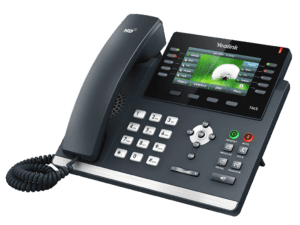How Much Does VoIP Business Service Cost in 2024?
VoIP Service usually costs around $40 – $55 a month (per user) for unlimited domestic calls. Businesses can get VoIP service on 15 stations for around $2,600 – $7,000, or up to 50 extensions for around $25,000. Calculate your cost, start here:
Feature Solutions

Ring Central
- Unlimited Domestic Calling
- Toll-Free Numbers
- Cost: $20.00/Month Per User
Reliable VoIP Providers and Pricing in 2024
In the dynamic world of business communication, VoIP(Voice over Internet Protocol) technology has emerged as a game-changer. Companies like Vonage, Nextiva, Ooma, 8×8, Zoom, RingCentral, and Dialpad are at the forefront of this revolution, offering diverse VoIP services. This article delves into each provider, highlighting their advantages, disadvantages, and pricing structures.
1. Vonage
Advantages:
- Vonage boasts a robust feature set, including video conferencing, team messaging, and file sharing.
- It offers high flexibility and scalability, making it suitable for businesses of all sizes.
- Integration capabilities with CRM systems enhance productivity.
Disadvantages:
- Some users report occasional quality issues during high usage.
- The pricing can be higher compared to some competitors.
Pricing:
- Vonage’s pricing varies based on the package, with plans typically starting from around $13.99 per user per month.
2. Nextiva
Advantages:
- Known for its exceptional customer service and reliability.
- Nextiva offers an easy-to-use interface and seamless CRM integration.
- The service provides advanced analytics and call tracking features.
Disadvantages:
- Limited third-party integrations compared to some competitors.
- Some features are locked behind higher-tier plans.
Pricing:
- Basic plans start from approximately $18.95 per user per month.
3. Ooma
Advantages:
- Ooma is praised for its straightforward pricing and ease of installation.
- It offers a reliable service with excellent call quality.
- Ideal for small businesses due to its cost-effectiveness.
Disadvantages:
- Lacks some advanced features found in other VoIPservices.
- Not as scalable for larger enterprises.
Pricing:
- Ooma’s pricing is competitive, with plans starting at about $19.95 per user per month.
4. 8×8
Advantages:
- 8×8 offers a comprehensive suite of VoIP features, including international calling options.
- Strong focus on security and compliance.
- It provides a unified communications platform.
Disadvantages:
- The interface can be complex for new users.
- Some customers have reported issues with customer support.
Pricing:
- Prices begin at around $25 per user per month, making it an affordable option.
5. Zoom
Advantages:
- Zoom is renowned for its video conferencing quality.
- It offers extensive integration capabilities and user-friendly interface.
- Scalable solutions suitable for businesses of all sizes.
Disadvantages:
- The primary focus is on video conferencing, which might limit its functionality as a comprehensive VoIP provider.
- Concerns about security and privacy have been raised in the past.
Pricing:
- Zoom’s VoIP services are part of its broader package, with prices starting at approximately $14.99 per user per month.
6. RingCentral
Advantages:
- Offers a wide range of features including video conferencing, team messaging, and cloud-based phone systems.
- Known for its reliability and robust integration capabilities.
- Suitable for a wide range of business sizes.
Disadvantages:
- Higher cost compared to some competitors.
- Some users find the interface less intuitive.
Pricing:
- RingCentral’s plans start at about $20.00 per user per month.
7. Dialpad
Advantages:
- Dialpad stands out for its AI-driven communications platform, offering real-time transcriptions.
- User-friendly interface and easy setup.
- Strong focus on collaboration tools.
Disadvantages:
- Some advanced features are only available in higher-tier plans.
- Limited customization options.
Pricing:
- Basic plans begin at approximately $15 per user per month.
Choosing the right VoIP business service provider depends on your specific business needs, budget, and the size of your organization. Each of these providers has its strengths and weaknesses, and pricing varies according to the features and scalability offered. It’s advisable to conduct a thorough analysis and possibly trial a few services before making a final decision. This will ensure that the chosen VoIPt service aligns perfectly with your business communication requirements.
COMPARE QUOTESWhat to Look For in a Business VoIP Service


Business VoIP Service Can Save You a Heap of Cash
The biggest boon for business comes in the savings that VoIP can give you. The typical cloud VoIP service will cost you around $15 per user per month.
One business line can cost around $30 per month. You must also factor in that each new user will require a new line.
When you use VoIP, you only need it to be installed once. Depending on your internet speed, it can handle multiple users on a single line, which dramatically cuts costs. You won’t be paying to have multiple lines installed either: after the initial installation, the work is done.
VoIP phones can also lower your bills. You pay nothing for internal calls on a VoIP service, and usually pay lower rates on external calls. This means that money can be spent on other business necessities.


VoIP Offers Compelling ROI on Features for Business
Your old-fashioned phone line has just one use. You can use it as a phone. Is that enough to justify their costs?
In comparison, VoIP services have some incredible benefits:
- Call forwarding: are you going to be out of the office for a while? Then set up your VoIP phone to forward incoming calls to your cell phone, without having to give your cell phone number to customers.
- Voicemail to Email: this service can transcribe your voicemails and email them to you. If you can’t access your voicemail, this keeps you in the loop.
- Call parking: if you need to be on the move while talking to your clients, this is a feature you can’t pass up. Call parking means that you can put a call on hold before resuming the call on another device.
Many VoIP packages also offer an automated greetings service to direct your customer’s calls.
Voice Over Internet Protocol Installation is a Breeze
Running phone lines into your business is disruptive. That’s just a fact. In some cases, you may even need to close for a day so that the phone company can do the work.
When you install a VoIP system, it’s dead easy. If you’ve already got an internet connection, your business can use VoIP. No disruption, no mess, no fuss.
What’s more, if you find that you like using VoIP, you can issue employees with VoIP wireless phones. What is VoIP wireless phone technology? It lets you make calls over VoIP anywhere that you can connect to WiFi.
This means that if you’re grabbing a bite at a cafe, you can connect to their WiFi and make an internal call for free. Not bad, right?


VoIP Service Offers Increased Flexibility and Cuts Expenses
Some VoIP services aren’t limited to voice calls, either. If you need videoconferencing, then you can forget about using Skype or Hangouts. Just grab your VoIP phone and start videoconferencing!
While this is an extra feature and may incur further costs, it can’t be beaten in terms of convenience. VoIP service can cut telecommunications by more than 50%.
VoIP For Business Gives a Professional Image
Bringing cellphones into meetings is inappropriate and unprofessional. When you put your cell phone number on a business card or advertisement, it doesn’t look professional. You need a business number for that.


When you get a VoIP system, you can get a business number cheaply and easily. What’s more, if you prefer to talk on your cellphone, you can just redirect it to your cell. It will still look professional and make your company look better.
VoIP numbers aren’t tied to any specific location either, so there is a high degree of customization available. Need to change your number? You can do that in a second.
Voice Quality is Higher with VoIP – Making it Worth the Money
How many times have you answered the phone and not been able to understand what the person is saying? How many times have they not been able to understand you?
Unlike cell phones, VoIP doesn’t depend on signal quality. If you’ve got an internet connection, your voice will be clear.
In comparison to old-fashioned phones, you also get higher voice quality. While it depends on your speed and bandwidth, you will probably get crisper audio than you would on a traditional phone.


It Won’t Matter if Your Line Goes Down
If you use a cloud VoIP provider, it won’t even matter if you lose power in your building. You can redirect calls to a cell phone or a traditional phone with no issues.
No more losing business because of circumstances outside of your control. You can still do business, no matter what.
Better Customer Support
Calling the phone company for support can be a torturous experience. VoIP services tend to offer much better customer support than their traditional alternatives.
VoIP services also have better user interfaces for complex operations such as call forwarding. Thanks to its basis in modern technology, all of these tasks become easy.
Work From Around the World
As long as you have a WiFi connection, you can use a wireless VoIP phone. This means that if you have remote employees, you can communicate with them, wherever they are in the world.
Traditionally, you would need to get them on Skype if you wanted to talk. Today, you can just call them up. No more international call rates, no more communication breakdowns: it’s that easy.


Company Expanding? VoIP Expansion is Easy
VoIP systems are almost infinitely scalable. If you need to add new numbers and phones to the system, you can do that with just a phone call or an email.
As soon as you’ve got your account altered, you can add the phones to the network. No setup fees, no additional lines, just a small increase in your costs.
No matter the size of your business, you can make your VoIP system work for it.
COMPARE QUOTESFrequently Asked Questions
Here are six frequently asked questions about business VoIP (Voice over Internet Protocol) services, along with their answers:
-
What is Business VoIP and How Does it Work?
- Answer: Business VoIP is a technology that allows you to make voice calls using a broadband Internet connection instead of a regular (analog) phone line. It converts your voice into a digital signal that can be transmitted over the Internet. With VoIP, you can directly call from a computer, a VoIP phone, or other data-driven devices. It often includes features like voicemail, call analytics, and integration with other business applications.
-
What are the Cost Benefits of Switching to VoIP for My Business?
- Answer: VoIP can offer significant cost savings compared to traditional phone services. It reduces the need for separate phone lines, often comes with lower monthly service costs, and reduces charges for long-distance and international calls. Additionally, because VoIP integrates with various applications, it can streamline business processes, further reducing costs.
-
Can I Use My Existing Phone Hardware with VoIP?
- Answer: In many cases, yes. Some VoIP services work with existing phone hardware using an adapter. However, others may require new IP phones designed for VoIP technology. It’s important to check with your VoIP provider about their hardware requirements and compatibility.
-
How Reliable is VoIP, and What Happens if My Internet Goes Down?
- Answer: VoIP is generally very reliable, with voice quality often indistinguishable from traditional telephony. However, its reliability depends on your internet connection. If your internet goes down, VoIP services might be interrupted. Many providers offer mobile apps that allow calls to be routed to mobile phones, or you can have calls automatically forwarded to a predetermined number.
-
Is VoIP Secure?
- Answer: VoIP can be very secure, but it depends on the measures taken by both the service provider and the user. Providers often use encryption and secure networks to protect data. Businesses should also use strong network security practices, including firewalls, secure Wi-Fi networks, and VPNs to enhance security.
-
Does VoIP Service Include International Calling, and is it Cost-Effective?
- Answer: Many VoIP providers offer international calling, and it’s usually more cost-effective than traditional phone service. However, rates and plans vary, so it’s important to check with the provider. Some plans include unlimited international calling to certain countries, while others might charge lower per-minute rates for international calls.
VoIP is a Good Investment
We hope that you now feel informed on VoIP. If you started this article wondering “what is VoIP,” we hope that you now feel empowered to make the switch.
Would you like to read more articles about business telephony? Then check out our blog, where you can find articles like this one on call center services.
Do you have some questions that you’d like us to answer about VoIP? Ready to make the switch? GETt STARTED BELOW



